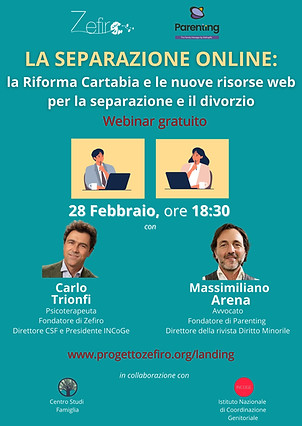
NEWS & EVENTI
Incontro Nazionale dei Coordinatori Genitoriali organizzato da INCoGe
Lo scorso 20 giugno L’Istituto Nazionale per la Coordinazione Genitoriale (INCoGe) ha organizzato un incontro per i Coordinatori Genitoriali soci dell’Istituto. Questo momento di confronto dibattito è stato fortemente voluto dagli associati come luogo dove portare le proprie esperienze e domande e laboratorio in cui sviluppare proposte da sottoporre a enti e tribunali da parte di professionisti utilizzano il metodo della coordinazione genitoriale.

IL PIANO GENITORIALE: Il DOTTOR CARLO TRIONFI IN CONFERENZA CON LE DOTTORESSE SCALZARETTO E FRANGI
LA RIFORMA CARTABIA:
PARLA L'ESPERTO CARLO TRIONFI
In collaborazione con Zefiro, il dottor Trionfi ha presentato le novità della riforma con una particolare attenzione alle nuove risorse web per aiutare genitori e figli a gestire la separazione.

Le interviste al Dott. Trionfi
Su Donna Moderna "Separazioni e divorzi veloci: cosa cambia in concreto"
Debra Carter ci parla del futuro della Coordinazione Genitoriale all'interno del Master del Centro Studi Famiglia
UNA NUOVA PROFESSIONE PER PSICOLOGI, ASSISTENTI SOCIALI, EDUCATORI E AVVOCATI
Un nuovo professionista aiuterà la famiglia.
Che cos'è il Coadiuvante del Giudice e come possiamo formarci per diventarlo.
ANSIA E DEPRESSIONE: RISCHI IN PIÙ PER I FIGLI DEI SEPARATI?
Secondo alcuni studi, per i figli di genitori separati il rischio di sviluppare ansia, depressione, problemi relazionali e difficoltà nello studio aumenta di un terzo. I consigli per contenere il trauma.
FIGLI DI SEPARATI: AL VIA IL NUOVO PROGETTO PER I GRUPPI DI PAROLA
Uno strumento a sostegno dei bambini e dei ragazzi che vivono l’esperienza della separazione dei genitori che per l’Autorità dovrebbe divenire una misura strutturale dei piani per l’infanzia e la famiglia.
COSA SUCCEDE AI BAMBINI QUANDO URLIAMO?
I bambini vivono forti emozioni che appaiono “esagerate”. Sarà solo con lo sviluppo delle aree neo-corticali (neocorteccia) che, gradualmente, il bambino acquisirà la capacità di regolare i propri impulsi ed emozioni.
CARTA DEI DIRITTI DEI FIGLI DI GENITORI SEPARATI
La Carta dei Diritti dei Figli nella Separazione dai Genitori presentata dal Garante per l’Infanzia e l’Adolescenza.
Dieci principi fondamentali.
USE OF SOLUTION-FOCUSED AND FAMILY NARRATIVE APPROACHES IN WORKING WITH HIGH CONFLICT FAMILIES: STRATEGIES AND TECHNIQUES THAT CAN BE UTILIZED IN PARENTING COORDINATION AND CO-PARENTING COACHING
This article will outline the basic tenets and potential practical application of both a solution-focused and a family narrative approach in providing alternative and helpful techniques that can be utilized by parenting coordinators and co-parenting coaches working with high conflict families transitioning to a post separation or divorce state. It is suggested that children and parents adapt better to their new family circumstances when they are empowered to find their own solutions to the challenges they face and are given the opportunity to create, for themselves, a positive and desirable family story.
LA CARTA DEI DIRITTI DEI FIGLI NELLA SEPARAZIONE DEI GENITORI
L’Autorità garante per l’infanzia e l’adolescenza ha realizzato la Carta dei diritti dei figli nella separazione dei genitori, i cui principi fondanti sono ispirati alla Convenzione di New York e in particolare a quelli dell’ascolto e del superiore interesse dei minori. La Carta è anche il frutto di quanto emerso dal coinvolgimento di esperti, associazioni e soprattutto dal contributo fornito dalle persone di minore di età.
HIGH-CONFLICT DIVORCE
This article reviews available research studies of high-conflict divorce and its effects on children. Interparental conflict after divorce (defined as verbal and physical aggression, overt hostility, and distrust) and the primary parent’s emotional distress are jointly predictive of more problematic parent-child relationships and greater child emotional and behavioral maladjustment. As a group, children of high-conflict divorce as defined above, especially boys, are two to four times more likely to be clinically disturbed in emotions and behavior compared with national norms. Court- ordered joint physical custody and frequent visitation arrangements in high-conflict divorce tend to be associated with poorer child outcomes, especially for girls. Types of intervention programs and social policy appropriate for these kinds of families are presented.










%20copia.jpg)